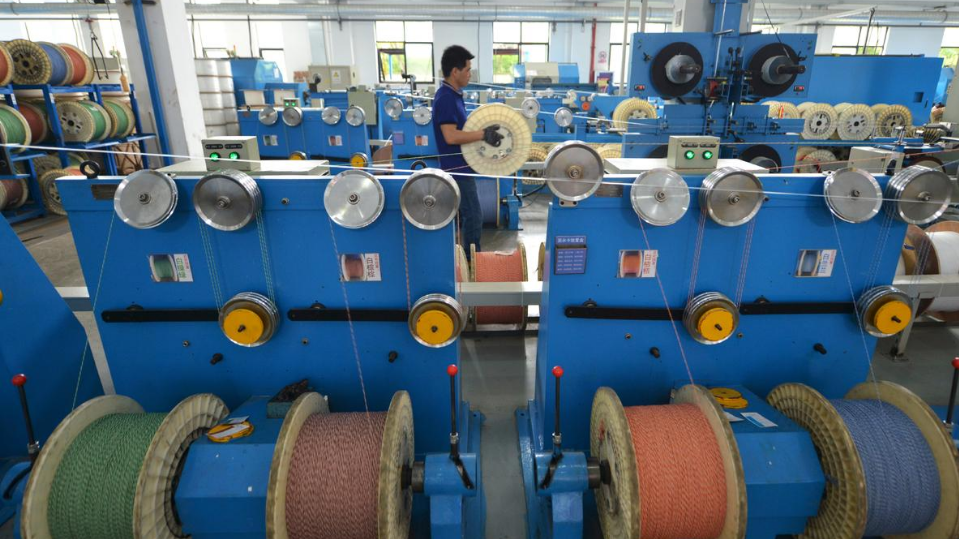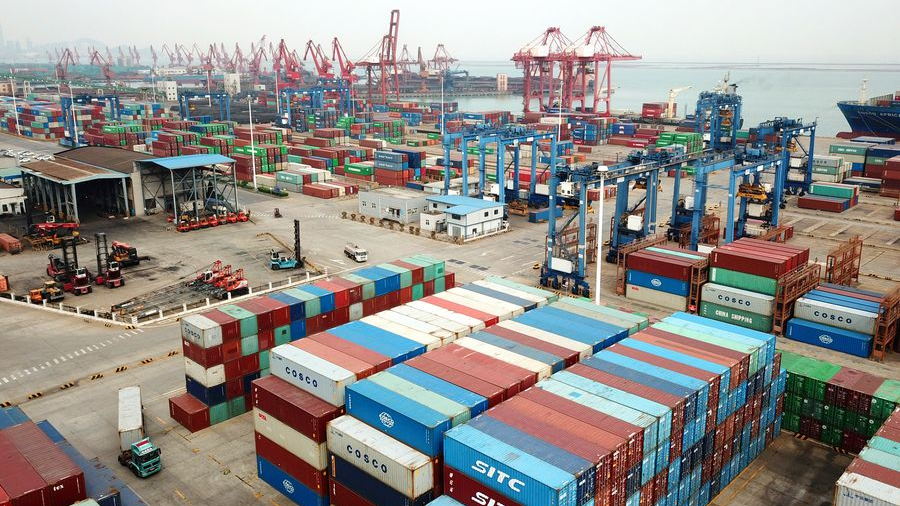
Editor's note: Ken Moak taught economic theory, public policy and globalization at the university level for 33 years. The article reflects the author's opinions, and not necessarily the views of CGTN.
What exactly does being less reliant on China imply? Recently, issues like trade and investment restrictions and decoupling are been hotly debated in some countries due to COVID-19 and, in some cases, their deteriorating relationship with China. But, whatever it implies, becoming "less reliant on China" might exacerbate their economies because China is a major trade partner and hugely important for other countries in climbing out of a COVID-19-induced recession.
Leaving China implies losing competitiveness and giving up on an increasingly huge affluent market. China's comprehensive infrastructure system of efficient transportation, reliable energy sources, supply chain, and an adequate pool of skilled labor afford foreign firms enormous production cost advantages, thus raising competitiveness. The 1.4 billion consumers have huge potential purchasing power giving their savings of 25 percent of disposable income and household debt/GDP ratio of 52 percent (most of which are in mortgage loans).
China is the only major economy that is expected to record positive growth in 2020 because of its early and efficient measures to curb the spread of COVID-19 and the sizable stimulus recovery packages. Its massive infrastructure investment recovery plan and "dual circulation" strategy would sustain the country's economic growth for years to come.

Containers are being handled at Lianyungang Port, east China's Jiangsu Province, April 14, 2020. /Xinhua
Containers are being handled at Lianyungang Port, east China's Jiangsu Province, April 14, 2020. /Xinhua
Against this backdrop, business prospects for both domestic and foreign enterprises in China would most likely improve, particularly when the government designates private consumption as the engine of growth of which urbanization is the key. Building roads and railways to connect the expanding cities would increase regional development, while new investments are planned in capital construction, manufacturing and tertiary industries. There would be a huge need for the import of resources. Private consumption will increase, expanding export opportunities for foreign commodity and consumer goods producers.
Chinese made goods were, in large part, sustained a prolong period of price stability, affording the West to maintain low interest rate policies. Affordable consumer good prices, from clothing to computers, increased the West's standard of living and stabilized consumption spending. Low interest rates fueled more consumption and encouraged investment. Relying on China, from this perspective, does not seem bad.
Relocating production from China, on the other hand, incurs an uncertain future. Largely because of its mishandling of the pandemic and the trade and technology wars against China, the U.S. is having difficulties in reversing its economic downward trajectory. With uncertain prospects of profitability, at least in the foreseeable future, U.S. President Donald Trump is demanding businesses to abandon China is like asking them to jump from "paradise" to a "burning hell."
Furthermore, it takes time and money to dismantle, ship and reinstall equipment from China to the elsewhere. Enterprise shareholders are interested in returns to investment, not politics. They are very likely unable or unwilling to incur the cost and take the time to relocate. Little wonder that over 92 percent of American firms are staying put in China, defying Trump's threats and rejecting his cash incentives to return "home."

Workers at a construction site in an industrial park of an economic development zone in Handan City of north China's Hebei Province, May 4, 2020. /Xinhua
Workers at a construction site in an industrial park of an economic development zone in Handan City of north China's Hebei Province, May 4, 2020. /Xinhua
Relocating high-end manufacturing to other developing countries is equally folly for similar reasons, only worse. India, for example, may have a huge and inexpensive labor force, but it is poorly trained. In addition, its supporting infrastructures are woefully inadequate – poor roads, frequent power shortages and lack of supply chain, just to list a few. Poverty is widespread. Poor production environment and lack of consumption power are the major reasons why companies like Ford Motors are downsizing in the country.
All the hype of Australia walking away from China and turning to India to buy its commodities could go nowhere. Since becoming the epicenter of COVID-19, the relatively small Indian economy of less than 3 trillion U.S. dollars is expected to contract by over 11 percent if not further in 2020. India would not be able to buy the quantity of Australian exports that China was purchasing, even if it wants to.
The fact of the matter is that China is just simply an economically important country. For Japan, China is essential for the country's socio-economic well-being given its aging and dwindling population. China is buying more German products than any other country, elevating the it to become Germany's biggest trading partner. The UK probably needs China more than it wants to admit because of Brexit. France and Canada have few if any alternative markets that are on par with the size of China. The China-U.S. economies are so deeply entwined that "divorce" will be costly if not impossible. India is struggling to find alternatives to replace the products it banned from China. Without the Chinese market buying a third of its exports, Australia could end up an "unlucky continent."
Yes, becoming self-sufficient is desirable because it offers supply stability or sustain a minimum level of manufacturing activity. But the cost of decoupling just for the sake to be "less reliant" on China far outweighs any benefits it might bring.
(If you want to contribute and have specific expertise, please contact us at opinions@cgtn.com.)